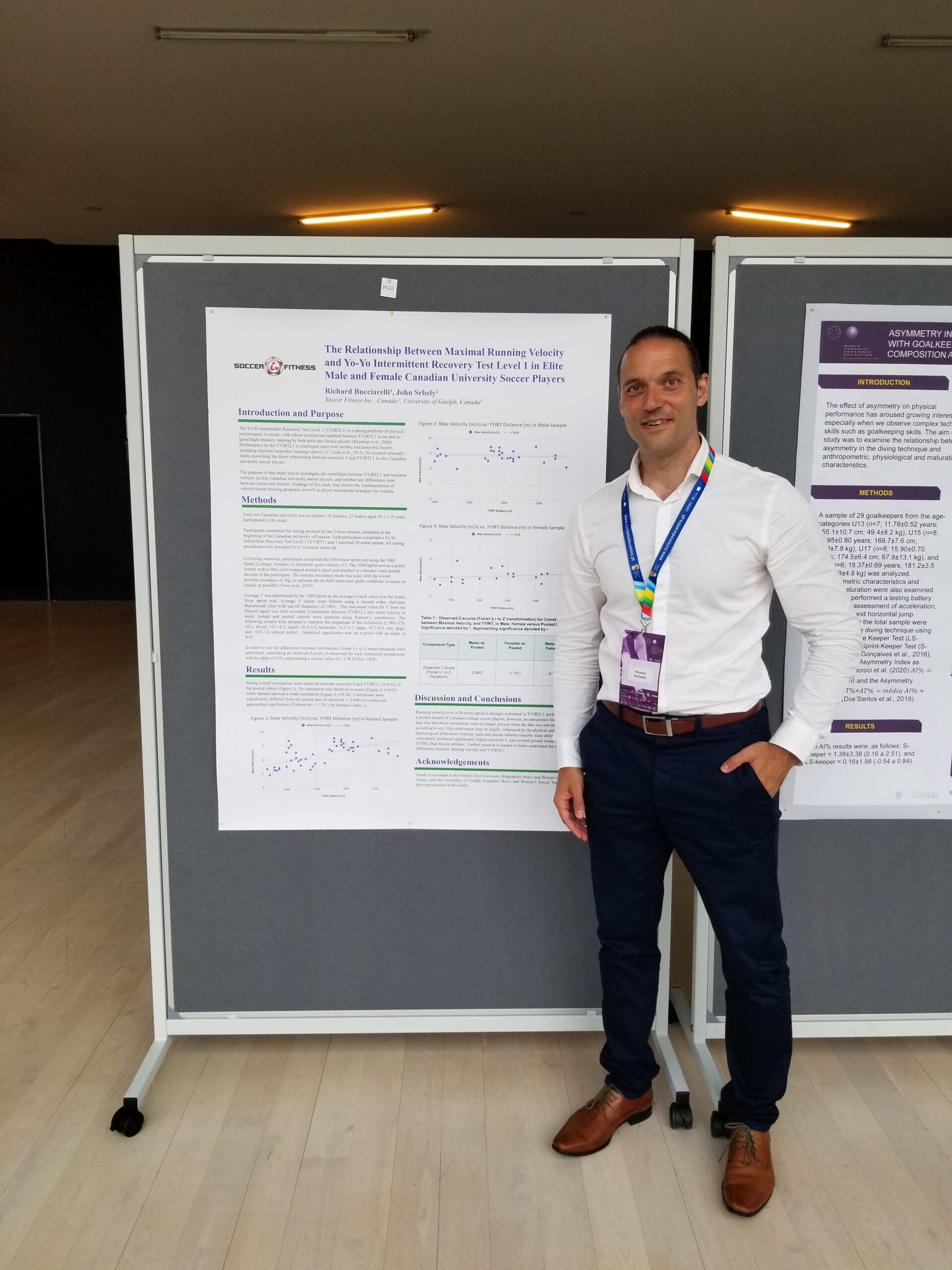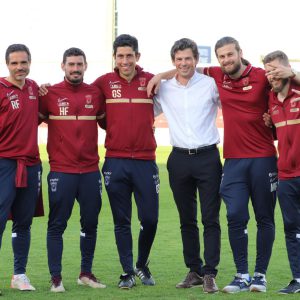

Make Canadian Soccer Better: Lessons from the 9th World Congress on Science and Soccer
Between June 15 to 18, 2022, I attended and presented research at the 9 th World Congress on Science and Soccer in Coimbra, Portugal, hosted at the historic Universidade de Coimbra.
Held every two years, in the years between the FIFA World Cup and UEFA European Championship, this event is the preeminent conference for theoretical and applied research specific to the sport of soccer, and this year’s gathering was no exception. The conference drew Keynote Speakers, presenters, and attendees from top professional clubs and international football associations across the globe. Portugal – the host country – had excellent representation, with dozens of accomplished professionals, presenters and sports scientists working at the highest levels of the game, down to emerging professionals including Master’s and PhD students.
Despite the conference’s global prestige, one country that has a glaring lack of representation at the conference – in 2022 and in all of the previous years – is Canada.
In fact, at the 2022 Congress, my small paper investigating the relationships between aerobic and anaerobic fitness in Canadian university soccer players, was the only research from a Canadian sports scientist at the entire event. There were no other Canadians in attendance either.
I’ve made it a point in my career to attend and submit my own research to every Congress on Science and Soccer, dating back to the inaugural one, held in Liverpool, England, back in 2008, and this is not the first time that I’ve been the lone Canadian in the room.
While Canada has enjoyed a great measure of success at the international level recently – having won an Olympic Gold Medal in Women’s Soccer and qualified for the Men’s FIFA World Cup for the first time in over 30 years – it is still surprising that Canadian soccer professionals – both coaches and applied practitioners, as well as researchers and academics – don’t seem to want to attend global conversations that could help improve the sport in Canada.
What can Canada gain as a soccer nation from attending and participating in the World Congress on Science and Soccer? And, what can be done to bridge the gap that currently exists between science and soccer in Canada?
I’ll attempt to answer both of those questions, and perhaps pose one or two more, in the article below.
What’s in it for Canadian Soccer Coaches?
Canadian soccer coaches stand to gain a lot from attendance at soccer-specific sports science conferences.
Why? Because soccer coaching is inextricably linked with sports science.
In other countries, teaching coaches how to conduct fitness assessments, calculate and monitor physical training loads, produce periodized training plans, incorporate physical fitness into training sessions, and use video and software technology to analyze players’ in-game performance, is a mandatory part of the coach licensing program. In Canada, it is not.
The problem for Canadian soccer coaches is twofold. They are not given the knowledge they require to implement science-backed soccer protocol, and they are not expected to (and do not) work with professional fitness coaches, sports scientists, or performance analysts, in their day-to-day work.
Soccer coaches in Canada are the only ones responsible for planning training with their teams, and this means that, by default, they are the only coaches responsible for planning the players’ exercise programs.
And this, in turn, means that Canadian soccer coaches should try to learn as much as possible about exercise science, so that they can optimize the planning and delivery of their (soccer-related) exercise training.
What better way, then, for soccer coaches to learn more about soccer-specific exercise science, than from the world’s experts at the world’s leading soccer-specific exercise science conference?
Many soccer coaches – not just from Portugal but from across Europe, the United Kingdom, Asia and even the United States – were present at this year’s Congress.
In addition to knowledge and practical expertise, coaches stand to gain even more from attendance, including:
- The opportunity to discuss and share ideas with their peers, including other youth coaches, as well as top professional and international coaches
- The chance to network with soccer professionals from around the world, which may even open up future employment opportunities
- The chance to connect with vendors, with products ranging from state-of-the-art exercise equipment, GPS and camera-based tracking and analysis systems, coaching software, European soccer tours, and much more
Bridging the Gap: How to Bring Canadian Soccer into the Fold
The good news is that we don’t need to look very far to see how we can effectively bridge the gap. Portugal has set an excellent example for Canada to follow.
Five years ago, the Portuguese Football Association created a program designed to create partnerships between universities with graduate students wishing to conduct research in soccer, and the Youth and Senior Men’s and Women’s National Teams programs.
Since that time, they have raised hundreds of thousands of Euros in research funding and grants, and they have graduated over 20 Master’s and PhD students directly from the program.
I recently interviewed Dr. Bruno Travassos, Exercise Physiologist with the Portuguese Men’s National Futsal Team, and professor at the University of Beira Interior, located in Covilhã, Portugal, to get his thoughts on how it has worked out thus far. In our correspondence, I asked him to elaborate on his role as a physiologist and researcher with the Portuguese FA. Here is what he wrote:
I’m physiologist of the national futsal team AA and at the same time member of the Portugal Football School. As a physiologist, my main role is to monitor and manage
all load and wellbeing information for the team, during both training and competition. The main goal is to provide, on a daily basis, information for the coach staff, helping them to understand the general impact of training and competition load in the players, as well as their wellbeing and readiness for competition. Also, based on this information we discuss with the coach staff the content and structure of the training sessions and how it can be improved to achieve the individual and the collective performance purposes. The individual preparation of players during the camps is also my responsibility. However, in the context of a national team we believe that we should sustain and maintain the routines and the programs that each player has in their clubs. So, based on the routines of each player, we adjust individually their work according to the plan of the training sessions, their wellbeing and recovery. In the Portugal Football School, we contribute in the development of some research studies that used some of the information that we collect with the national teams. These research programs usually involve the students from different universities and allows the development of the knowledge from and to the field. Also, we also collaborate in some meetings with clubs to spread our best practices in the national teams and also to present some of the obtained results in research.
Travassos is one of several sports science experts working with the Portuguese National Teams, internally. On top of working with the teams, he is also conducting research and supervising a team of researchers at his university. There has never been and there is not one example of this level of excellence and professionalism in the Canadian National Teams programs.
I wanted to know more about the Portuguese program that connects universities with the FA, and how it has helped the on-field performance of the National Teams. This is what Travassos had to say:
We believe that the football and futsal in Portugal have been improved in last few years due to the continuous collaboration between coaches, the Portuguese FA and the Coaches Association, and the Universities. We believe that despite the differences in the approaches to the sport (Universities want to produce science and coaches need to Win matches and Portuguese FA wants to develop sports), the collaboration allows us to improve the research and practice continuously. The coaches and Portuguese Football Association continuously identify new challenges and problems and issues that need to be solved, and ask the universities to develop research ideas based on these challenges. At the same time, the universities are developing new research that needs to be evaluated with the support of coaches and the Portuguese FA to collect data, discuss approaches and also to understand the impact of the results. At the end, we are all part of the same environment and working together allows a win-win relationship!
Ultimately, collaboration between soccer practitioners in Canada – including coaches, fitness coaches, and sports scientists – will serve to benefit all those involved with the sport, but especially the players these practitioners work with.
If sports can sustainably meet with science, as it has in Portugal and so many other successful soccer nations, perhaps Canada can improve the quality of coaching and training delivered to its talented players, and become a more successful soccer nation in the process.
Article by Richard Bucciarelli
Categories
Latest Courses
-
9 Lessons
-
1 Lesson
-
6 Lessons
You May Also Like
- News
- July 18, 2022
- News
- May 16, 2022
- News
- May 3, 2022
Developed by Brandit Digital Media Services.





